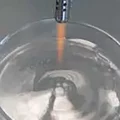Battery manufacturers should employ “Halt Hass” testing to determine the weaknesses in their battery designs, according to self-styled battery guru, Shmuel De-Leon. As Samsung launches its S8 mobile phone this week, alongside its eight point battery check, De-Leon issued a prophetic warning.
Speaking last week at the International battery seminar in Florida, De-Leon said that the risks from consumer product battery failure were now too high – not just from fire and loss of life but ultimately corporate bankruptcy.
Commenting on the Samsung GalaxyS7 debacle, De-Leon said Samsung should be commended for their prompt recall and for taking a US$5.3 billion hit over the event.
De-Leon drew upon his experience in military electronics in forwarding Halt Hass testing where equipment was exposed to extreme stress beyond specifications to determine where product weaknesses might lie.
Unlike DVT (Design Verification Testing), the purpose of HALT is to determine the operating and destruct limits of a design – why those limitations exist and what is required to increase those margins. HALT, therefore, stresses products beyond their design specifications.
HALT provides engineers with the opportunity to improve product design, increasing its robustness and minimizing possibility of costly warranty services and expensive product recalls after release.
HASS testing (Highly Accelerates Stress Screening) is a proven screening method developed to find manufacturing and production process induced defects in electronics and electro-mechanical assemblies, before those products are released to market.
HASS testing is a powerful testing tool for improving product reliability, reducing warranty costs and increasing customer satisfaction.
After a product has undergone HALT, HASS can be used in the production process. The goal of a HASS test is to induce failure modes that can be inherent or introduced in the production process.
HASS has been proven to be effective in screening failures that may have gone undetected in the burn-In testing process.
A product that passes normal production tests but fails in a HASS would have probably failed early after product release, and thus increasing warranty costs.
Since HASS stresses are more aggressive than conventional screening tests, a POS procedure is used to establish the effectiveness in revealing production induced defects.
A POS is vital for determining that the HASS stresses are capable of revealing production defects, but not so extreme as to remove significant life from the Unit Under Test (UUT).
Instituting HASS to screen product is an essential tool for maintaining a high level of product robustness. Since it will significantly reduce the test time required for product screening it also delivers long term savings.
Ongoing HASS screening assures that any weak components or manufacturing process degradations are quickly detected and corrected.
And it wouldn’t be a “Shmuel presentation” without a unashamed plug for the developers of “Halt Hass” testing – http://www.qualmark.com/… Ed












